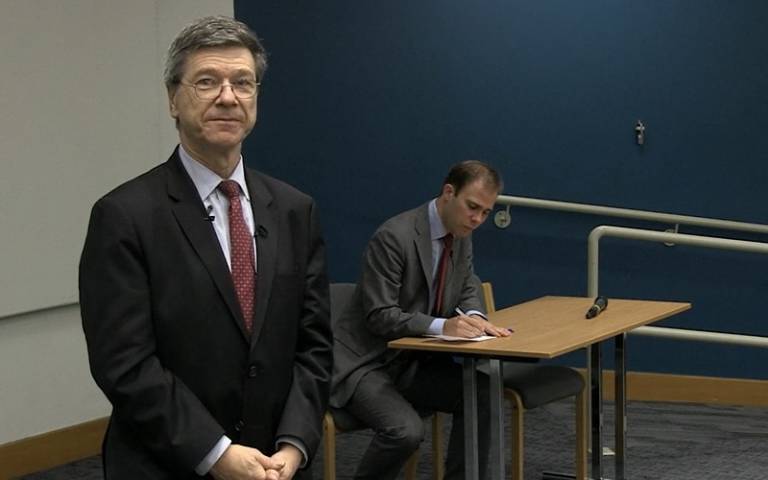Sustainable Development Goals and Global Economic Governance
20 March 2017
Jay Cedras (MSc Global Governance and Ethics) on the GGI keynote lecture with Professor Jeffrey Sachs.

The highly complex global economy is deeply intertwined with political, technological and corporate forces. It has tremendous momentum that has long been moving in a particular direction. This has come with phenomenal benefits: poverty has reduced sharply and our global productive output has increased to a magnitude once unimaginable. Technological advancements and ground-breaking research have allowed us to prevent diseases and live longer.
We now have an unprecedented level of global wealth. However, the direction of the world economy is unsustainable and undesirable given its detrimental negative externalities. Hence, the greatest puzzle of our time is to work out how to change direction, and quickly.
To address this puzzle, the Global Governance Institute (GGI) recently hosted Professor Jeffery Sachs, one of the world's most prominent economists, senior UN advisor, former Director of the Earth Institute and a leading thinker on sustainable development.
The environmental crisis and the fallacy of self-organising economies
Sachs began the lecture by comparing our collective dilemma to driving on a winding road with a cliff ahead - a change of direction is needed immediately. As an introduction, Sachs also debunked the 'economics 101' myth of self-organising economies: in reality, he noted, the infamous 'invisible hand' is not one hand but 15 billion hands, each pulling in a particular direction.
The directional strength of the world economy brought two fundamental challenges. According to Sachs, the primary reason for changing direction is the looming environmental crisis. It is unquestionable that climate change represents the largest existential threat to our planet and thus our survival. This overwhelming problem is one that we have collectively caused (granted some corporations substantially more than you and I). Human-made climate change is predominately driven by the use of fossil fuels and it has already led to irreversible consequences. The world must now decarbonise by around mid-century and global temperature rises must remain under 2 degrees Celsius. In addition to climate change, the world is facing the massive destruction of biodiversity, with millions of species threatened by extinction. Yet, we see even less action on this issue and initiatives such as the UN 2010 goal to slow the loss of biodiversity remain relatively unheard of by the general public.
A global injustice
The secondary, yet nonetheless fundamental challenge - the unfairness of the world economic system - appeals to our moral compasses as well as our instrumental reasoning. The large degree of global wealth that exists today makes the presence of poverty inexcusable. Perhaps most poignant are the statistics Sachs provided. 6 million children under five die every year from preventable causes such as Malaria and lack of basic natal care. Sachs was frank about the underlying reason for this - these children are dying of poverty. It is a symptom of an unjust, immoral world. According to the World Bank, the international poverty line is US$1.90 per person per day and there were over 700 million people living below the line in 2015. Meanwhile, the global economic output totals US$125 trillion. Doing the math should generate frustration - less than 1% of global output could end poverty.
Aspiration and desperation
Given these extremely urgent problems, we collectively face the question: what can be done? The Sustainable Development Goals (SDGs) represent the most seminal global effort to address this puzzle. Known officially as Transforming our world: the 2030 Agenda for Sustainable Development, the SDGs are made up of seventeen goals with 169 targets between them. These goals and targets cover all three pillars of sustainable development: protecting the environment, promoting social fairness and ending poverty. Importantly, they were agreed upon by all 193 member states of the UN and thus represent a global consensus.
Goals 1 to 9 mostly fall under the umbrella of ending global poverty, and include goals such as the eradication of poverty (Goal 1) and hunger (Goal 2) or the provision of quality education for all (Goal 4). Environmental goals include creating sustainable cities and communities (Goal 11) and taking climate action (Goal 13). Finally, goals concerned with social fairness include promoting gender equality (Goal 5) and reducing inequalities (Goal 10). The 17th and final SDG ('Partnerships for the Goals') aims to strengthen commitment and facilitate implementation of the goals through global partnerships. Goal 17 is perhaps most pivotal to sustainable development, acting as the backbone for all other goals.
As described by Sachs, the SDGs are "a mix of high aspiration and high desperation … negotiated in a sense of crisis". As such, they are our best option and greatest hope. Hope however, is insufficient without effort. The success of the SDGs will depend on our collective action. According to Sachs, universities provide a coordinative base to develop and proliferate new ideas, to alter norms and to create new outcomes. As students, therefore, we have a particularly important role to play in advancing the SDGs and promoting awareness of them.
A brighter future
Climate change and global inequality undoubtedly remain deeply political issues. They are complex problems that raise complex questions. How do we break the political inertia of states? How do we address the problem of short public attention spans or the greed of corporate leadership? How do we make a sensible transition without wrecking the economy? What should fundamentally be taken away from Sachs's lecture is the need to continue pushing for the alternative route away from the cliff, regardless of the hurdles ahead. From the move toward electric cars to developing hydroelectric potential, a more sustainable future is not unimaginable. This was not simply an informative lecture on global economics delivered by a world-renowned economist, but a call to action. Far from utopian, Sachs delivered an ambitious yet realistic approach to our puzzle. It is our shared responsibility, yours and mine, to make the SGDs real and attainable. To quote Sachs: "we could save 6 million lives per year - could you imagine something more rewarding?"
 Close
Close


